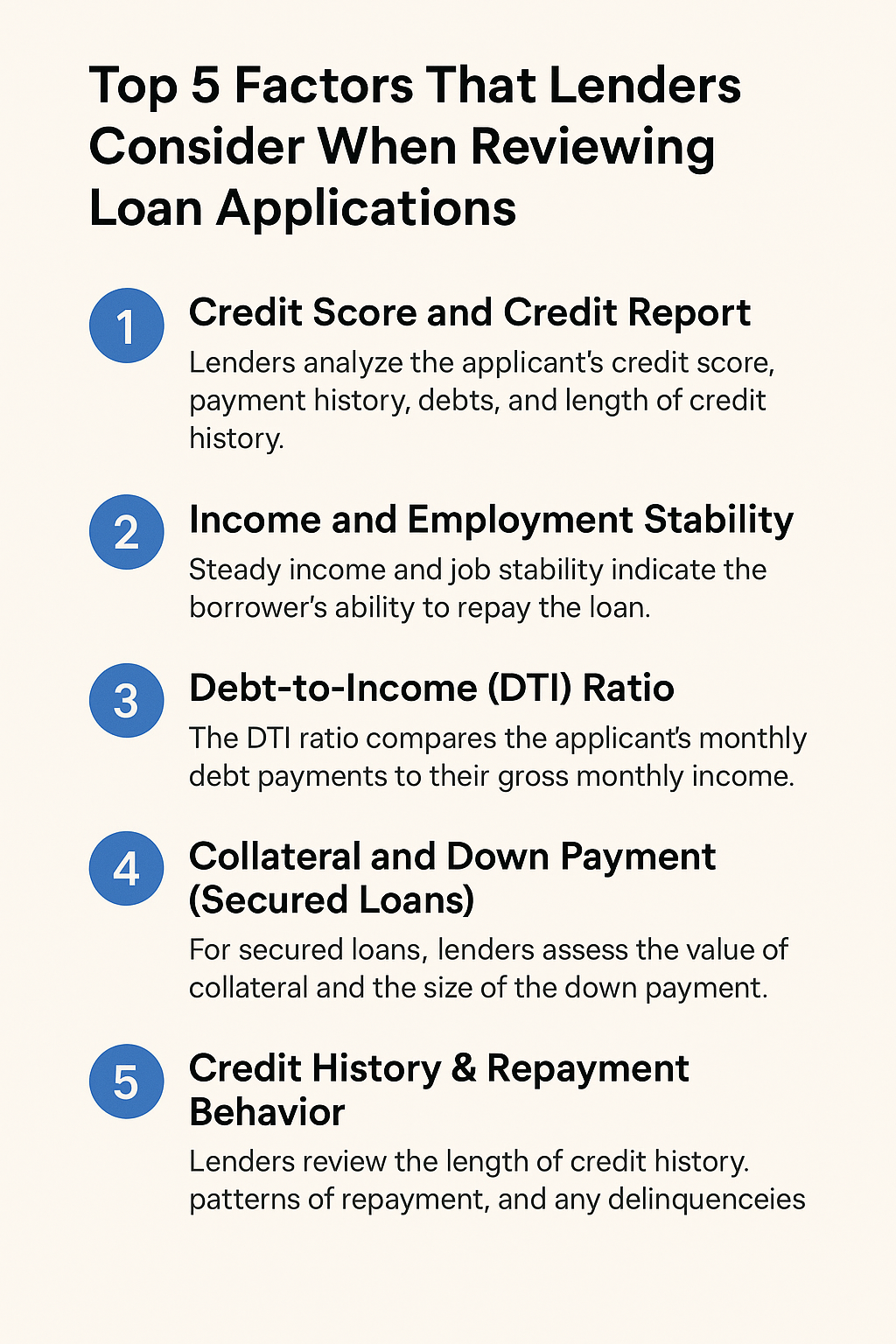When you ask for a loan, like a mortgage, an auto loan, a personal loan, or a business line of credit, lenders look at your credit history to see how likely you are to pay them back. You can write a better application, get better terms, and have a better chance of getting approved if you know what lenders want. This article talks about the five most important things that lenders look at when they look at loan applications in great detail. It has helpful advice, best practices, and real-life examples.
1. Your Credit Report and Score
1.1 What Does a Credit Score Mean?
Based on your past credit history, a three-digit number between 300 and 850 tells lenders how likely you are to pay back a loan. The most common types are:
- FICO Score: Most loans in the U.S. are based on the FICO Score, which goes from 300 to 850.
- VantageScore: The three biggest credit bureaus worked together to make VantageScore, which is also between 300 and 850.
A lower score means a higher risk, and a higher score means a lower risk.
1.2 What Lenders Look for When They Check Your Credit Report
Experian, Equifax, and TransUnion are the three biggest credit bureaus that send your credit report to lenders. They check:
- Payment history (35% of FICO): This is the ratio of late payments to on-time payments.
- Amounts owed (30%): This is the total amount of credit you have used and the amount you still owe.
- Length of credit history (15%): This is how long your accounts have been open.
- Credit mix (10%): The different kinds of credit accounts you have, like revolving and installment accounts.
- New credit (10%): This includes requests and accounts that have just been opened.
If your credit report is clean, you pay your bills on time, and you don’t use your credit too much, you can be trusted.
1.3 Ways to Improve Your Credit Score
- Pay your bills on time: Make reminders or set up automatic payments.
- To use less credit, don’t let your balances go above 30% of your limits.
- Don’t get too many new credit cards; hard inquiries can hurt your scores for a little while.
- Keep an eye on your old accounts: Don’t let your credit history get too long.
- Once a year, go to AnnualCreditReport.com and look at your credit report to make sure there are no mistakes that could be lowering your score.
2. Work and Pay That Stays the Same
2.1 Looking at Your Income
Lenders want to know that you have a steady job so you can pay back the loan. Most people agree on these things:
- Pay stubs from the last 30 to 60 days.
- W-2 forms for two years.
- You have to fill out Form 1040 if you work for yourself.
- Bank statements that show that deposits are being made on a regular basis.
2.2 Work History
You are less likely to get hurt if you have worked for the same company or in the same field for two years. You might have to do more paperwork or pay higher interest rates if you change jobs a lot or have gaps in your work history.
2.3 People Who Work for Themselves or in the Gig Economy
Lenders will:
- Look at the company’s tax returns, like its Schedule C or corporate returns.
- The number of deductions you can take can change your gross income.
- You might need a Profit and Loss (P&L) statement.
A lot of lenders now offer special loans to self-employed people, but you may need to show more proof and go through more checks.
3. The DTI Ratio
3.1 How to Get DTI
The Debt-to-Income Ratio tells you how much of your gross monthly income goes toward paying off debts. This is how to study:
- To find your DTI, take the total amount of money you pay each month on your debts and divide it by the amount of money you make each month before taxes. After that, multiply that number by 100.
- The front-end ratio takes into account all of the costs of living, like rent or mortgage payments, taxes, and insurance.
- Your back-end ratio is made up of your credit cards, car loans, student loans, and mortgage.
3.2 The Best DTI Levels
- Usually, you need a back-end DTI of 43% or less for a regular loan.
- Your DTI may be able to go up to 50% with some FHA loans.
- VA loans are more flexible, but they still want your debt-to-income ratio (DTI) to be less than 41%.
If your DTI is lower, you can pay off new debt.
3.3 Ways to Make Your DTI Better
- Pay off debts with high interest rates first, like credit cards.
- Before you apply, don’t take on any new debt.
- To make more money, get a part-time job or a side job.
- You can pay less each month by refinancing your loans.
4. A Down Payment and Security (Secured Loans)
4.1 What Is Collateral?
When you get a secured loan, like a mortgage or an auto loan, the lender checks the value of the collateral and how easy it is to sell.
- Real estate: Get an appraisal to make sure the price is right.
- Cars: Kelly Blue Book or car dealer guides.
- Investment accounts: Stocks that you can sell quickly and that have rules about how much money you can borrow.
If lenders have good collateral, they are less likely to lose money, which could mean lower interest rates.
4.2 What You Should Write Down
A bigger down payment means the borrower is serious and lowers the Loan-to-Value (LTV) ratio:
LTV=(Amount of loan÷Value of collateral)×100%
- Most of the time, you have to put down at least 20% on a regular mortgage to avoid paying for Private Mortgage Insurance (PMI).
- Most car loans need a down payment of 10% to 20%.
- You usually have to pay 10% to 25% of the cost of the equipment you want to buy up front. It all depends on what kind of asset it is.
If you put down more money up front, you might be more likely to get approved and pay less each month.
5. Your Credit History and How You Pay It Back
5.1 The Length and Patterns of Your Credit History
Lenders don’t just look at your credit score; they also look at how your credit has changed over time:
- Here are the ages of the newest and oldest accounts: It’s good to have a long history.
- Lenders check to see if payments are consistently late by looking at how often and how recently they are late.
- Scheduled and revolving accounts: A good mix of both shows that you know how to use credit responsibly.
5.2 Payments That Were Missed and Public Records from the Past
- The risk goes up a lot if you’re 30, 60, or 90 days late.
- Collections or charge-offs: You might need to show and explain that the problem is fixed.
- It’s hard to get approved if your report shows bankruptcies, judgments, and liens for 7 to 10 years.
5.3 Letters of Explanation
You should write a Letter of Explanation (LOE) if you got bad grades because you lost your job or had a medical emergency.
- Tell us what happened and how it affected your money.
- Write down what you’ve done or are doing to improve things.
- You have been doing the right things for more than six months, like paying your bills on time.
An LOE can help you win by showing that you are honest and in charge.
6. Things to Think About
6.1 Why You Need the Loan
Depending on why you want the loan, lenders may see risk in a different way:
- When you refinance a home instead of buying a new one, the rules for appraisals are usually stricter.
- When you combine your debts, lenders want to know how you plan to pay them all back.
- Funding for small businesses: Underwriting might look at how risky the industry is and how likely the business plan is to work.
6.2 The State of the Economy and the Market Right Now
External factors can change the rules for underwriting:
- The interest rate environment: If rates go up, it might be harder for people to borrow money.
- The housing market: LTVs can change if home prices go down.
- Changes in the law: New laws, like the Dodd-Frank updates, can change how much risk lenders are willing to take to protect their customers.
You can’t change these, but knowing about them will help you set goals that you can reach.
6.3 Your Relationship with the Lender
Customers who already have an account or are relationship banking clients may get:
- Preferential rates: There are reasons to sell more than one thing.
- You won’t have to do as much paperwork if your income and assets have already been checked.
- Because of a long history, you have a better chance of getting approved.
Final Thoughts
A lot of things are connected that can make it hard for you to get a loan. Your credit score, how stable your income is, your DTI ratio, the value of your collateral, and how you have handled credit in the past are all important. You can lower your risk as a borrower by checking your credit report, keeping a steady job, being responsible with your debt, and making sure you have all the right paperwork. Keep in mind that different lenders may have different ideas about these things depending on how much risk they are willing to take and what kinds of loans they offer. It’s a good idea to compare prices and use relationship banking when you can.
You can confidently apply for loans, get better terms, and reach your financial goals, whether they are buying a house, starting a business, or paying off debt.
Frequently Asked Questions (FAQs)
1. How good does my credit score need to be to get a loan? Most lenders won’t lend you money unless your FICO score is at least 620. People with scores of 700 or higher get the best deals. If you put down a bigger down payment, some government-backed loans, like FHA and VA loans, will accept scores as low as 580 or even 500.
2. Can you still get a loan if you don’t have any credit? Yes, but you might have to pay more interest or get someone else to sign for you. Some lenders have “credit builder” products, while others let you use things like rent payments and utility bills to help your credit.
3. How does my debt-to-income ratio affect my ability to get a loan? You can pay the new bills if your DTI is lower. A lot of lenders want your back-end DTI to be 36% or less, but you should try to keep it below 43%.
4. What is safety? You can use your car, house, tools, or investment accounts as collateral. Lenders think about how much the item is worth on the market and how easy it is to sell when they decide how much to lend.
5. How long do I have to wait after I file for bankruptcy to get a loan?
- You can get an FHA loan two years after your Chapter 13 discharge or three years after your Chapter 7 discharge.
- If there are special circumstances, you can get a regular loan four years after Chapter 7 or two years after Chapter 13.
- You can get VA loans two years after you leave the military, but you need to have a certain amount of money.
6. Will my credit score go down if I apply for a loan? If you ask for more than one car loan or mortgage in a 14- to 45-day period, they only count as one request. For about a year, a hard inquiry can lower your score by a few points.
7. What can I do to improve my chances if my credit score is low?
- Get someone with better credit to sign with you.
- If you want to lower your LTV, put down a bigger down payment.
- A secured loan is one that is backed by something that has value. This is a good way to get a good payment history.
8. Do lenders check out my savings and investments? Yes. Savings accounts, CDs, and investment portfolios are all types of assets that can help you get a higher DTI. They can also show that you don’t have a lot of money coming in by showing that you have money set aside to make payments.
9. How long does it take to get a loan?
- Getting a personal loan usually takes a few hours to two days.
- You can usually get a loan for a car the same day you buy it.
- Getting a mortgage can take anywhere from 30 to 45 days, depending on the appraisal, the paperwork, and the underwriting.
10. Is it really a good idea to let someone open an account? Of course, yes. If you combine your accounts or show that you’ve been with the same bank for a long time, you might get faster approvals, lower fees, and better rates.
References
- Consumer Financial Protection Bureau. “What is a credit score?” CFPB. https://www.consumerfinance.gov/ask-cfpb/what-is-a-credit-score-en-315/
- FICO. “What Is a FICO® Score?” FICO. https://www.fico.com/featured‑products/fico‑score
- AnnualCreditReport.com. “Get Your Free Credit Reports.” https://www.annualcreditreport.com/
- U.S. Department of Housing and Urban Development. “Qualifying Ratios for FHA Loans.” https://www.hud.gov/program_offices/housing/sfh/buying/fha_ratios
- Investopedia. “Debt-to-Income Ratio (DTI).” https://www.investopedia.com/terms/d/debttoincomeratio.asp
- Veterans Affairs. “Credit Score Requirements: Mortgage.” https://www.va.gov/housing-assistance/home-loans/how-to-apply/credit-scores/
- Federal Reserve. “Consumer Credit.” https://www.federalreserve.gov/releases/g19/
- Equifax. “Credit Utilization Ratio.” https://www.equifax.com/personal/education/credit/score/credit-utilization/






